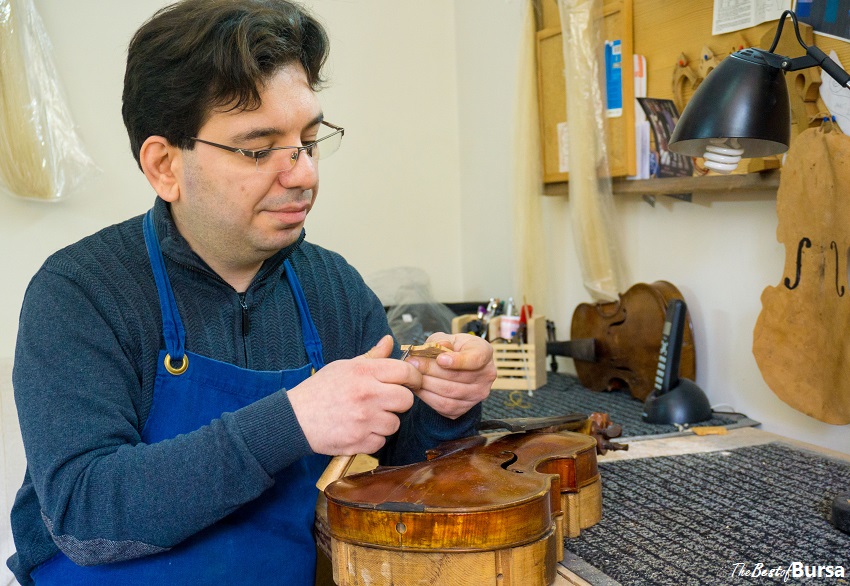“In a typical year, I make three or four violins,” Can explained to me as we sat together in his workshop in Bursa’s Konak neighborhood. Hand tools littered his workbench, maple and spruce planks were neatly stacked on a floor rack, a picture of his mentor sat on a shelf high on the wall, and a selection of beautifully handmade violins were lined up on a wooden stand behind his desk.
“Only three or four? Per year?” I asked. I must have looked a little surprised as I tried to make sure that I understood him correctly. We were, after all, chatting in his primary language, not mine. “Yes, three or four,” he confirmed. “On average, it takes me three and a half months to make a single violin from scratch. But my violins are master quality, nearly on par with the European makers.” Can seemed to speak with a hint of both confidence and humbleness. From across the room, his handiwork certainly looked masterfully done to me, but I knew nothing about the intricacies of violin making.
Can Türkel has been making musical instruments since he was a boy. Back then, Can’s father played bass guitar in a local band and ran the family’s downtown music store. Can started his working years making tambourines in his father’s workshop. Though music is in his bloodline, his enjoyment of all things mechanical kept him focused on making musical instruments rather than playing them. “I can play a little,” Can suggested. “But I’m a mechanic, not a musician.”
Can’s mechanical aptitude landed him a spot in the instrument fabrication department at Istanbul Technical University’s music conservatory. After graduating in 2002, he returned to Bursa with the dream of opening his own workshop. His family made space for him the basement of the music store, and Can began making traditional bow-and-string instruments. For nearly ten years, he focused his efforts on perfecting the kemençe, a small, three-string Turkish fiddle.
Wishing to try his hand at the much more technically challenging work of making violins, Can closed his kemençe workshop and headed to Freiburg, Germany, for an apprenticeship in the violin workshop of Bursa-born master violin maker Ersen Aycan. As violin makers in Germany are among the best in the world, Can took the opportunity to soak up as much knowledge and practice as he could with the hope of bringing the skillful art of violin making back to Bursa.
In 2013, Can opened his current Konak shop, Maça Müzik, named after his family’s downtown music store. In the front of his shop, he sells commercially produced instruments to the general public. But his real gems are in the workshop in the back of his store. There, he makes, repairs, and restores professional-grade violins, violas, cellos, and basses. “Most of my violin business is from performance violinists needing repairs or from conservatory students wanting to upgrade to a professional instrument,” Can explained. That’s actually how I got connected with Can. Mehmet, a friend of mine who is in his last year of study at a nearby conservatory, bought one of Can’s violins a few years ago. Mehmet recommended to me that I visit Can in his shop and take a look at his operation.
Being a top-tier violin maker is clearly one of Can’s goals, and he’s proud to have been the first to bring professional violin making to Bursa. Can loves his work; he’s happily in his shop daily from dawn till dusk. He also loves the friendly competition that has sprung up from a couple of other violin makers in the city. “When I opened this shop a few years ago, I was the first and only violin maker in Bursa,” he recalled. “Now, as far as I know, there are three of us in town. We’re all friends, and we push each other to sharpen our skills and become better craftsmen.”
Though I’m certainly no musician and I probably couldn’t tell the difference between a Stradivarius and a cheap production violin, I’m glad I stopped into Can’s shop. I got to meet a nice guy with a deep passion for his work and I learned a little something about a craft I previously knew nothing about.
You can find Can’s shop at 63 Yavuz Sokak in Konak, Nilüfer, next to the Konak Culture Center. Visit his website at luthiercanturkel.com.








